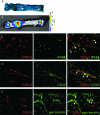Cox-2 deletion in myeloid and endothelial cells, but not in epithelial cells, exacerbates murine colitis
- PMID: 21156970
- PMCID: PMC3047239
- DOI: 10.1093/carcin/bgq268
Cox-2 deletion in myeloid and endothelial cells, but not in epithelial cells, exacerbates murine colitis
Abstract
Patients with inflammatory bowel diseases are at increased risk for colorectal cancer. Pharmacological inhibition of cyclooxygenase (COX) function exacerbates symptoms in colitis patients. Animal models of colitis using Cox-2-knockout mice and COX inhibitors also indicate that COX-2 has a protective role against colon inflammation. However, because conventional Cox-2 deletion and COX-2 inhibitors eliminate COX-2 function in all cells, it has not been possible to analyze the role(s) of COX-2 in different cell types. Here, we use a Cox-2(flox) conditional knockout mouse to analyze the role of COX-2 expression in distinct cell types in the colon in response to dextran sulfate sodium (DSS)-induced colitis. We generated Cox-2 conditional knockouts in myeloid cells with LysMCre knock-in mice, in endothelial cells with VECadCreERT2 transgenic mice and in epithelial cells with VillinCre transgenic mice. When treated with DSS to induce colitis, both myeloid cell-specific and endothelial cell-specific Cox-2-knockout mice exhibited greater weight loss, increased clinical scores and decreased epithelial cell proliferation after DSS injury when compared with littermate controls. In contrast, epithelial-specific Cox-2 knockouts and control littermates did not differ in response to DSS. These results suggest that COX-2 expression in myeloid cells and endothelial cells, but not epithelial cells, is important for protection of epithelial cells in this murine colitis model.
Figures






References
-
- Loftus EV., Jr. Clinical epidemiology of inflammatory bowel disease: incidence, prevalence, and environmental influences. Gastroenterology. 2004;126:1504–1517. - PubMed
-
- Matuk R, et al. The spectrum of gastrointestinal toxicity and effect on disease activity of selective cyclooxygenase-2 inhibitors in patients with inflammatory bowel disease. Inflamm. Bowel Dis. 2004;10:352–356. - PubMed
-
- Kefalakes H, et al. Exacerbation of inflammatory bowel diseases associated with the use of nonsteroidal anti-inflammatory drugs: myth or reality? Eur. J. Clin. Pharmacol. 2009;65:963–970. - PubMed
Publication types
MeSH terms
Substances
Grants and funding
LinkOut - more resources
Full Text Sources
Other Literature Sources
Molecular Biology Databases
Research Materials

